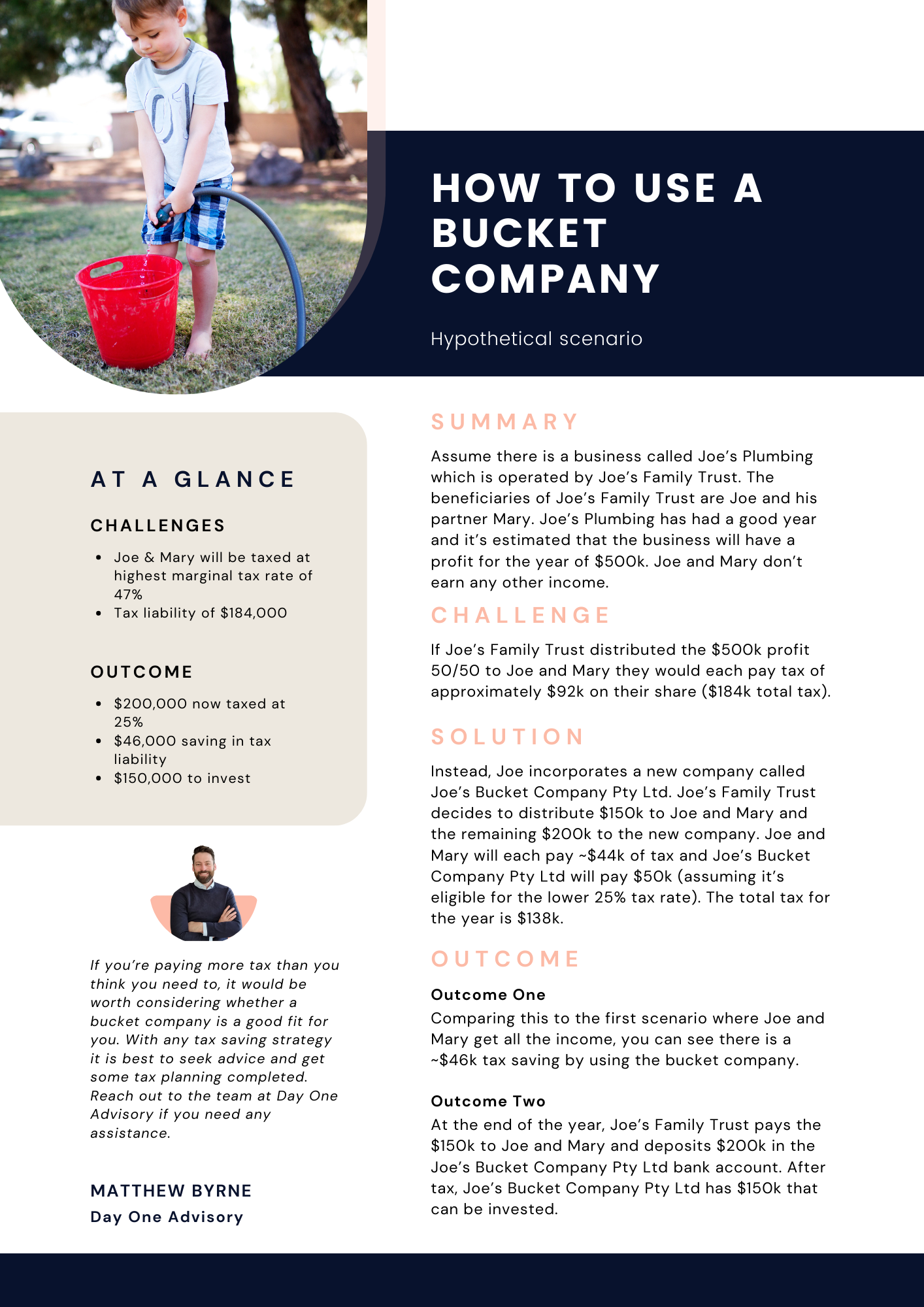What is a bucket company and why would you use one

Matt Byrne
Director
Summary
There are all sorts of wonderful tax minimisation strategies out there for businesses but at Day One Advisory, we believe your structure is the most important. If you don’t have the right foundation, you’ll miss out on excellent tax planning opportunities. The right structure should be appropriate for your unique circumstances while still providing flexibility so it can adapt and change as your business does.
One method to manage your tax liability is to use what we refer to as a ‘bucket company’.
So, what is a bucket company?
A bucket company is just a normal pty ltd company, but its purpose is to hold profits to make the most of the flat tax rate. Once it’s got those profits it can either sit on the cash or it can invest the money.
Why would you use a bucket company?
Broadly speaking, we have two tax rate systems in Australia:
- 1. Individuals are taxed at a sliding scale depending on how much they earn. Currently, if an individual earns over $180k for the year, they’ll pay 47% tax on every dollar they earn over $180k. There are of course other rates up to that point but to keep it simple we’re just going to refer to that highest rate.
- 2. Companies pay a flat rate of tax at either 25% (if turnover is below $50m – oversimplified but generally that’s the case) or 30% (all other businesses). This flat rate applies no matter how much the company earns.
Once an individual earns over $180k, they are paying tax at 47% whereas a company is paying tax at 25%. This is a 22% difference which can really add up.
The benefit of a bucket company is that rather than paying tax at 47%, you may be able to limit the tax to 25%. Now, we have to note that that is a massive oversimplification and unfortunately, our tax system is never that easy so if you’re thinking about going down this path, get some advice and understand the consequences of distributing to a bucket company.
- highest marginal tax rate for individuals 47%
- Flat rate of tax for companies that turnover >50m 25%
Who is a bucket company most suitable for?
Businesses that are run through a trust or investors that hold their investments via a trust. Basically, you have to be able to distribute the profits to the bucket company, so a trust is required.
Usually, we see bucket companies used where a business is operated through a family trust and the business is earning enough money that the individual beneficiaries’ taxable incomes are above the $180k mark.
A bucket company can also form part of a structure where there is a trading company. Let’s say you’ve got two unrelated investors holding shares in a company that runs a business. If that company declares a dividend every year it will go through the family trust that holds the shares and then need to be distributed out to the beneficiaries of the trust. If you don’t need the cash personally or you’ve got income above $180k, you might choose to distribute the income to a bucket company.
There are additional costs that come with establishing and administering a company so you need to weigh up the cost/benefit and make sure it’s worth the extra dosh.
A hypothetical scenario
In Summary
Bucket companies are a great tool to have when it comes to tax planning. They can help a business cap their current year tax liability at the flat company tax rate and can serve as an investment vehicle.
Pros
- Flat tax rate of 25% or 30% which is considerably lower than the highest marginal tax rate of 47% for individuals.
- They can provide an additional layer of asset protection should you not want to hold cash from your business personally.
- The bucket company can be used as an investment vehicle.
Cons
- There is a setup cost and ongoing administration as the company will need to lodge a tax return.
- Any profits distributed to the company need to be paid to the company or there will be additional tax consequences.
- If you invest through the company and make capital gains, the company isn’t eligible for the 12-month 50% CGT discount whereas an individual or trust may be.
Final Thoughts
If you’re paying more tax than you think you need to, it would be worth considering whether a bucket company provides any benefit. However, as noted above, there are some pitfalls so best to seek advice and get some tax planning completed.
Reach out to the team at Day One Advisory if you need any assistance.

